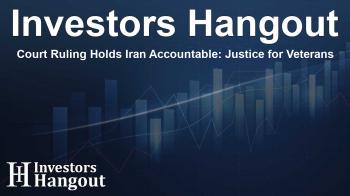Court Ruling Holds Iran Accountable: Justice for Veterans

Landmark Judgment for Veterans Against Iran
A recent judgment holds Iran accountable for its state-sponsored terrorism, affirming the commitment to justice for American servicemembers and their families. The U.S. District Court for the District of Columbia determined that Iran played a direct role in providing support for attacks against American forces in Afghanistan. The ruling in Baker v. Islamic Republic of Iran awarded over $201 million in damages to eight veterans and their families, marking a significant victory for those affected by terrorism.
The Significance of the Ruling
This judgment is not just about financial compensation; it represents a crucial acknowledgment of the sacrifices made by servicemembers. Each injured veteran received an average of about $17.7 million, reflecting their pain, suffering, and the economic impact of their injuries. The awards extended to the families of these servicemembers, recognizing the broad spectrum of their losses.
Survivors and Their Families
The breakdown of the awards illustrates the extensive impact on families: parents received $5 million each, spouses up to $8 million, children $3 million, and siblings $2.5 million each. This compensation is vital, yet it underscores a persistent issue—the ongoing struggle for all victims of terrorism to receive adequate justice.
Challenges in Securing Justice
While the Baker decision provides a path for justice, a subsequent ruling in Borochov v. Islamic Republic of Iran has cast a troubling shadow over these proceedings. The D.C. Circuit's decision limited the application of the Foreign Sovereign Immunities Act (FSIA), stating that liability exists only if there is an extrajudicial killing. This places survivors in a precarious situation, denying them justice simply because they survived an attack.
A Fragile Framework for Justice
This legal framework raises significant moral concerns. It essentially punishes those who live through traumatic experiences while allowing those responsible for such attacks to evade full accountability. The ruling suggests that a survivor’s experience is less valid than that of those who lost their lives, creating an illogical system that does not honor the sacrifices made by our soldiers.
Financial Barriers to Compensation
Another considerable hurdle is the U.S. Victims of State Sponsored Terrorism Fund, which is chronically underfunded. Despite a statutory commitment to compensate victims, many continue to wait for relief. In recent months, funds that could be utilized for compensation remain frozen, leaving countless claimants unpaid.
The Dilemma of Frozen Assets
Significant amounts, including $3.5 billion tied up in Afghan assets, could potentially provide relief if properly allocated. However, the lack of transparency around these funds raises more questions than answers, especially regarding their intended use. Victims of terrorism find themselves watching as these assets are debated rather than being used to provide them with the compensation they rightfully deserve.
Calls for Action
Cameron Firm, PC, along with Meridian 361 International Law Group, has taken a strong stance, advocating for immediate action from political leaders. They urge that the $3.5 billion should be released to victims through executive order and for Congress to amend the FSIA to ensure survivors can seek justice without the burden of these restrictive legal frameworks.
Peter Cameron and Ron Jenkins, veteran attorneys leading the challenge, are committed to ensuring veterans' rights remain upheld. They argue that justice should not depend on whether a servicemember was killed in combat, emphasizing the need for comprehensive reform to protect all those who have served and suffered as a result of terrorism.
Conclusion: A Responsibility to Act
The Baker ruling is a beacon of hope, yet it is overshadowed by the challenges presented by Borochov and the inequities of the USVSST Fund. To truly uphold the principles of justice, reforms must be enacted that allow all veterans, regardless of their circumstances, to receive the recognition and compensation they deserve.
Frequently Asked Questions
What was the outcome of the Baker v. Iran case?
The court ruled that Iran is liable for its support of terrorism, awarding over $201 million to veterans and their families.
How has the Borochov ruling impacted victims?
This ruling limits recoveries to cases involving death, making it more difficult for surviving victims to claim damages.
What is the USVSST Fund?
The U.S. Victims of State Sponsored Terrorism Fund is designed to compensate victims of terrorism, though it is currently underfunded.
What are the financial implications for the victims?
Many victims are awaiting compensation while significant amounts of frozen assets could be potentially allocated to them.
What actions are being called for by legal representatives?
Legal representatives are urging for the release of frozen assets for victim compensation and reforms to ensure all veterans can seek justice.
About The Author
Contact Ryan Hughes privately here. Or send an email with ATTN: Ryan Hughes as the subject to contact@investorshangout.com.
About Investors Hangout
Investors Hangout is a leading online stock forum for financial discussion and learning, offering a wide range of free tools and resources. It draws in traders of all levels, who exchange market knowledge, investigate trading tactics, and keep an eye on industry developments in real time. Featuring financial articles, stock message boards, quotes, charts, company profiles, and live news updates. Through cooperative learning and a wealth of informational resources, it helps users from novices creating their first portfolios to experts honing their techniques. Join Investors Hangout today: https://investorshangout.com/
The content of this article is based on factual, publicly available information and does not represent legal, financial, or investment advice. Investors Hangout does not offer financial advice, and the author is not a licensed financial advisor. Consult a qualified advisor before making any financial or investment decisions based on this article. This article should not be considered advice to purchase, sell, or hold any securities or other investments. If any of the material provided here is inaccurate, please contact us for corrections.

